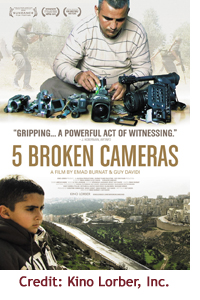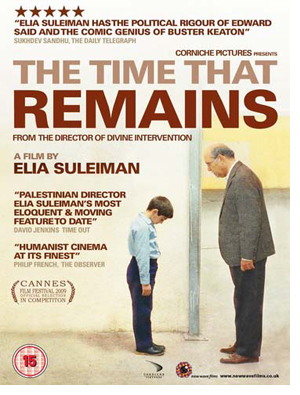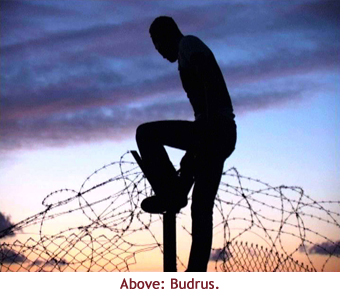 Film: 5 Broken Cameras
Film: 5 Broken Cameras
Directors: Emad Burnat and Guy Davidi
Screenplay: Guy Davidi
Genre: Documentary
?There’s a little bit of heaven in that muddy road to freedom.?
from ?Follow the Drinking Gourd? (American Negro spiritual)
Battle at the Centre of the Earth
we’re standing at a steel gate at the West Bank barrier that keeps Palestinians from approaching the Israeli settlements. A Palestinian man and a little boy are preparing to go through. The boy, Gibreel, hands an olive branch to the Israeli soldier, who gently accepts it.
Gibreel is the youngest of the five sons of Emad Burnat, a Palestinian from Bil?in, a village in the occupied West Bank in Palestine. It’s with the intention of documenting Gibreel’s development that Emad buys his first video camera. This film tells the story of how this and four other of his cameras meet their demise.
Gibreel’s birth coincides with the beginning of the resistance in Bil?in. Emad is soon asked to record village events: feasts, performances, and weekly political demonstrations.
After one turbulent demonstration in which one of his uncles is arrested, Gibreel returns home to his lovely, serene mom. She’s washing dishes; he’s earnestly munching potato chips as he describes the day’s events to her and tells her he wasn’t afraid. She smiles and tells him he’s a hero. He refutes her, admitting that in fact he had been a little afraid.
Like most villagers in Bil?in, Emad lives off his olive trees. The encroaching high-rise apartment buildings are eating up more and more of the land of these pastoral folk who can remain self-sufficient only as long as they can continue to harvest olives and graze sheep and goats on a sufficient acreage.
The visual symbolism is dramatic: the Palestinians are confronted daily by a view of Israeli urban sprawl as they herd their goats and sheep and pick olives. The buildings keep springing up, drawing nearer and nearer to the barrier, oblivious to the warnings of progressive economists who suggest that a return to small agrarian economies might stave off global warming and economic disaster. In this sense It’s the Palestinians who are at the vanguard of progress.
?We walk at our own pace,? says Emad, ?taking baby steps, as buildings pop out of the land.?
No doubt in response to mounting international scrutiny, Israelis make gestures of legality: the ?settlers? (a misleading term?these aren’t pioneer homesteaders but rather construction companies building apartment buildings to house the growing urban population) follow the rules to the letter.
The ?rules? dictate that anyone is permitted to place a trailer on a piece of land. Once they stick concrete posts in the ground they become legal occupants.
Palestinian activists stand under the trailers as Israelis try to lower them onto the Palestinian side of the barrier. Eventually the trailers are lowered anyway, so the Palestinians try something else: they lower a trailer onto the Israeli side. they’re ordered to remove their trailer. They peacefully comply, but the next day they lower another trailer and a bunch of Palestinians lock themselves inside after having painted ?Welcome to Bil?in? on the outside. The soldiers break into this second trailer, remove the inmates, and tell them to get rid of it.
At night the activists return and set up their own small concrete structures and commence to occupy them. The next night, their olive trees are set on fire.
People from all over the world join Bil?in’s weekly protests. Palestinians return from the worldwide diaspora, and so do countless Israelis and scattered Jews who support them, doggedly digging through the miles of mud and rocks to get to Freedom Land.
Israeli soldiers enter the village of Bil?in more and more often in an attempt to scare the villagers intending the weekly demonstrations. Emad’s brother Khaled is arrested. Emad keeps filming as his father and mother make agonizing efforts to stop the jeep. In the end his elderly father manages to climb on top of the jeep and cling to the grating on the back of the window, refusing to disembark unless his son is released.
Wait, it gets worse. Just when you think that at least this regime bears no resemblance to Assad’s Syria, the Israeli soldiers start showing up in Bil?in at night, arresting children and taking them away.
Wait, it gets worse . . .
5 Broken Cameras manifests seven of the Mindful Bard’s criteria for films well worth seeing: 1) it is authentic, original, and delightful; 2) it poses and admirably responds to questions that have a direct bearing on my view of existence; 3) it harmoniously unites art with social action, saving me from both seclusion in an ivory tower and slavery to someone else’s political agenda; 4) it inspires an awareness of the sanctity of creation; 5) it displays an engagement with and compassionate response to suffering; 6) it renews my enthusiasm for positive social action; and 7) it makes me appreciate that life is a complex and rare phenomenon, making living a unique opportunity.


